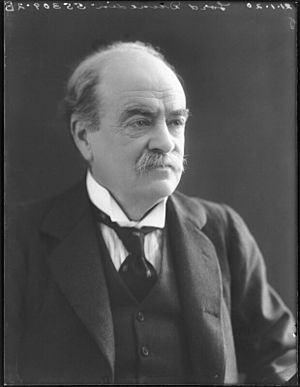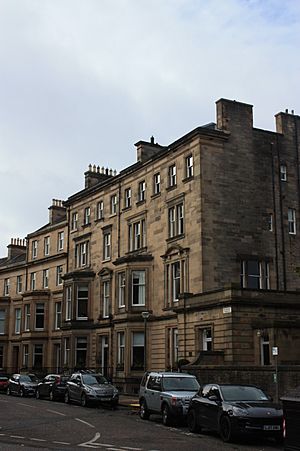Andrew Murray, 1st Viscount Dunedin facts for kids
Quick facts for kids
The Viscount Dunedin
|
|
|---|---|
 |
|
| Secretary for Scotland | |
| In office 9 October 1903 – 2 February 1905 |
|
| Monarch | Edward VII |
| Prime Minister | Arthur Balfour |
| Preceded by | The Lord Balfour of Burleigh |
| Succeeded by | The Marquess of Linlithgow |
| Lord Justice General | |
| In office 1905–1913 |
|
| Monarch | Edward VII George V |
| Preceded by | Lord Balfour |
| Succeeded by | Alexander Ure |
| Personal details | |
| Born | 21 November 1849 |
| Died | August 21, 1942 (aged 92) |
| Nationality | British |
| Political party | Conservative |
| Spouses | (1) Mary Edmonstone (1857–1922) (2) Jean Elmslie Henderson Findlay (1885-1944) |
| Alma mater | Trinity College, Cambridge |
Andrew Graham Murray, 1st Viscount Dunedin (born 21 November 1849 – died 21 August 1942) was an important Scottish politician and judge. He held several high-ranking jobs in the government and legal system. For example, he was the Secretary for Scotland from 1903 to 1905. He also served as the top judge in Scotland, known as the Lord Justice General, from 1905 to 1913. Later, he became a Lord of Appeal in Ordinary, which is a senior judge in the highest court, from 1913 to 1932.
Contents
Early Life and Schooling
Andrew Graham Murray was born into a family of lawyers. His father and grandfather were both solicitors in Edinburgh. He went to Harrow, a well-known school, and then studied at Trinity College, Cambridge, one of the famous universities in England.
Starting a Career in Law and Politics (1891–1905)
In 1874, Andrew Murray became a lawyer in Scotland. This is called being "called to the Scottish Bar". Later, in 1891, he became a Queen's Counsel, which means he was a very experienced and respected lawyer.
That same year, he was elected as a Member of Parliament for the area of Bute. He kept this job until 1905. He also became the Solicitor General for Scotland. This role means he was a chief legal advisor to the government.
When the Conservative Party returned to power in 1895, Murray was again made Solicitor-General for Scotland. In 1896, he got an even bigger job as Lord Advocate. This is the main legal officer for the Scottish Government. He also joined the Privy Council, a group of important advisors to the King or Queen.
In 1903, he became the Secretary for Scotland. This was a very important position, and he was part of the government's main decision-making group, called the Cabinet. At this time, he lived in a nice part of Edinburgh.
Becoming a Senior Judge (1905–1932)
In February 1905, Andrew Murray left his government and Parliament jobs. He was appointed as the Lord Justice General and Lord President of the Court of Session. These are the highest judicial positions in Scotland.
To mark this important role, he was given a special title: Baron Dunedin. He held these top judicial jobs until 1913. After that, he was appointed as a Lord of Appeal in Ordinary. This meant he became a senior judge in the highest court in the United Kingdom, dealing with very important legal cases.
During his time as a Law Lord, he made decisions on many significant cases. These cases helped shape how certain laws were understood. He retired from this role in 1932.
Besides his main jobs, Lord Dunedin also served as Sheriff of Perthshire and Lord Lieutenant of Buteshire. These were local leadership roles. He received special honours from the King, becoming a Knight Commander and then a Knight Grand Cross of the Royal Victorian Order. In 1926, he was given an even higher title: Viscount Dunedin.
Family Life
Lord Dunedin was married twice. His first wife was Mary Clementina, and they had one son and two daughters. After Mary passed away in 1922, he married Jean Elmslie Henderson Findlay in 1923. They did not have any children together.
His only son, Ronald Thomas Graham Murray, was a soldier who fought in the First World War. Sadly, Ronald passed away in 1934, before his father. Lord Dunedin himself lived to be 92 years old, passing away in August 1942. Because he had no living sons, his special titles ended when he died.
Images for kids
 | William Lucy |
 | Charles Hayes |
 | Cleveland Robinson |




